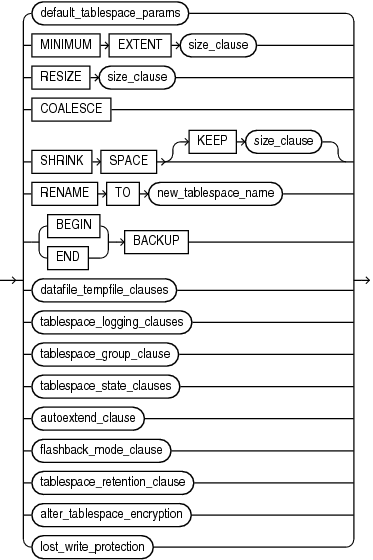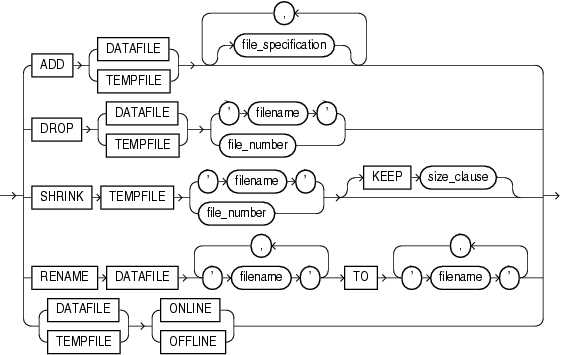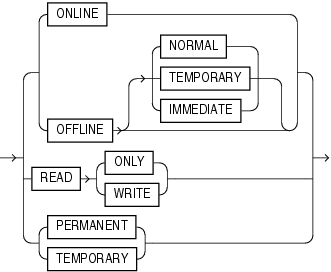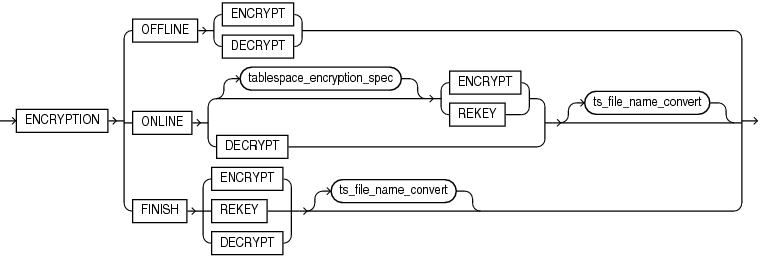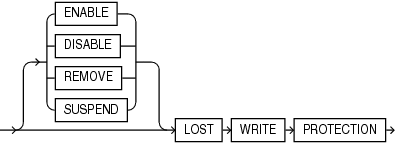ALTER TABLESPACE
Purpose
Use the ALTER TABLESPACE statement to alter an existing tablespace or one or more of its data files or temp files.
You cannot use this statement to convert a dictionary-managed tablespace to a locally managed tablespace. For that purpose, use the DBMS_SPACE_ADMIN package, which is documented in Oracle Database PL/SQL Packages and Types Reference.
See Also:
Oracle Database Administrator's Guide and CREATE TABLESPACE for information on creating a tablespace
Prerequisites
To alter the SYSAUX tablespace, you must have the SYSDBA system privilege.
If you have the ALTER TABLESPACE system privilege, then you can perform any ALTER TABLESPACE operation. If you have the MANAGE TABLESPACE system privilege, then you can only perform the following operations:
-
Take a tablespace online or offline
-
Begin or end a backup
-
Make a tablespace read only or read write
-
Change the state of a tablespace to
PERMANENTorTEMPORARY -
Set the default logging mode of a tablespace to
LOGGINGorNOLOGGING -
Put a tablespace in force logging mode or take it out of force logging mode
-
Rename a tablespace or a tablespace data file
-
Specify
RETENTIONGUARANTEEorRETENTIONNOGUARANTEEfor an undo tablespace -
Resize a data file for a tablespace
-
Enable or disable autoextension of a data file for a tablespace
-
Shrink the amount of space a temporary tablespace or a temp file is taking
Before you can make a tablespace read only, the following conditions must be met:
-
The tablespace must be online.
-
The tablespace must not contain any active rollback segments. For this reason, the
SYSTEMtablespace can never be made read only, because it contains theSYSTEMrollback segment. Additionally, because the rollback segments of a read-only tablespace are not accessible, Oracle recommends that you drop the rollback segments before you make a tablespace read only. -
The tablespace must not be involved in an open backup, because the end of a backup updates the header file of all data files in the tablespace.
Performing this function in restricted mode may help you meet these restrictions, because only users with RESTRICTED SESSION system privilege can be logged on.
Syntax
alter_tablespace::=
alter_tablespace_attrs::=
(default_tablespace_params::=, size_clause::=, datafile_tempfile_clauses::=, tablespace_logging_clauses::=, tablespace_group_clause::=, tablespace_state_clauses::=, autoextend_clause::=, flashback_mode_clause::=, tablespace_retention_clause::=, alter_tablespace_encryption::=, lost_write_protection::=)
default_tablespace_params::=
(default_table_compression::=—part of CREATE TABLESPACE, default_index_compression::=—part of CREATE TABLESPACE, inmemory_clause::=—part of CREATE TABLESPACE, ilm_clause::=—part of ALTER TABLE, storage_clause::=)
Note:
If you specify the DEFAULT clause, then you must specify at least one of the clauses default_table_compression, default_index_compression, inmemory_clause, ilm_clause, or storage_clause.
datafile_tempfile_clauses::=
tablespace_logging_clauses::=
tablespace_group_clause::=
tablespace_state_clauses::=
flashback_mode_clause::=
tablespace_retention_clause::=
alter_tablespace_encryption::=
tablespace_encryption_spec::=
ts_file_name_convert::=
lost_write_protection::=
Semantics
tablespace
Specify the name of the tablespace to be altered.
Restrictions on Altering Tablespaces
Altering tablespaces is subject to the following restrictions:
-
If
tablespaceis an undo tablespace, then the only other clauses you can specify in this statement areADDDATAFILE,RENAMEDATAFILE,RENAMETO(renaming the tablespace),DATAFILE...ONLINE,DATAFILE...OFFLINE,BEGINBACKUP, andENDBACKUP. -
You cannot make the
SYSTEMtablespace read only or temporary and you cannot take it offline. -
For locally managed temporary tablespaces, the only clause you can specify in this statement is the
ADDclause.
See Also:
Oracle Database Administrator's Guide for information on automatic undo management and undo tablespaces
alter_tablespace_attrs
Use the alter_tablespace_attrs clauses to change the attributes of the tablespace.
default_tablespace_params
This clause lets you specify new default parameters for the tablespace. The new default parameters apply to objects subsequently created in the tablespace.
The clauses default_table_compression, default_index_compression, inmemory_clause, ilm_clause, and storage_clause have the same semantics in CREATE TABLESPACE and ALTER TABLESPACE. For complete information on these clauses, refer to the default_tablespace_params clause in the documentation on CREATE TABLESPACE.
MINIMUM EXTENT
This clause is valid only for permanent dictionary-managed tablespaces. The MINIMUM EXTENT clause lets you control free space fragmentation in the tablespace by ensuring that every used or free extent in a tablespace is at least as large as, and is a multiple of, the value specified in the size_clause.
Restriction on MINIMUM EXTENT
You cannot specify this clause for a locally managed tablespace or for a dictionary-managed temporary tablespace.
See Also:
size_clause for information about that clause, Oracle Database Administrator's Guide for more information about using MINIMUM EXTENT to control space fragmentation
RESIZE Clause
This clause is valid only for bigfile tablespaces, including shadow tablespaces which store lost write protection tracking data. It lets you increase or decrease the size of the single data file to an absolute size. Use K, M, G, or T to specify the size in kilobytes, megabytes, gigabytes, or terabytes, respectively.
To change the size of a newly added data file or temp file in smallfile tablespaces, use the ALTER DATABASE ... autoextend_clause (see database_file_clauses ).
See Also:
BIGFILE | SMALLFILE for information on bigfile tablespaces
COALESCE
For each data file in the tablespace, this clause combines all contiguous free extents into larger contiguous extents.
SHRINK SPACE Clause
This clause is valid only for temporary tablespaces. It lets you reduce the amount of space the tablespace is taking. In the optional KEEP clause, the size_clause defines the lower bound that a tablespace can be shrunk to. It is the opposite of MAXSIZE for an autoextensible tablespace. If you omit the KEEP clause, then the database will attempt to shrink the tablespace as much as possible as long as other tablespace storage attributes are satisfied.
RENAME Clause
Use this clause to rename tablespace. This clause is valid only if tablespace and all its data files are online and the COMPATIBLE parameter is set to 10.0.0 or greater. You can rename both permanent and temporary tablespaces.
If tablespace is read only, then Oracle Database does not update the data file headers to reflect the new name. The alert log will indicate that the data file headers have not been updated.
Note:
If you re-create the control file, and if the data files that Oracle Database uses for this purpose are restored backups whose headers reflect the old tablespace name, then the re-created control file will also reflect the old tablespace name. However, after the database is fully recovered, the control file will reflect the new name.
If tablespace has been designated as the undo tablespace for any instance in an Oracle Real Application Clusters (Oracle RAC) environment, and if a server parameter file was used to start up the database, then Oracle Database changes the value of the UNDO_TABLESPACE parameter for that instance in the server parameter file (SPFILE) to reflect the new tablespace name. If a single-instance database is using a parameter file (pfile) instead of an spfile, then the database puts a message in the alert log advising the database administrator to change the value manually in the pfile.
Note:
The RENAME clause does not change the value of the UNDO_TABLESPACE parameter in the running instance. Although this does not affect the functioning of the undo tablespace, Oracle recommends that you issue the following statement to manually change the value of UNDO_TABLESPACE to the new tablespace name for the duration of the instance:
ALTER SYSTEM SET UNDO_TABLESPACE = new_tablespace_name SCOPE = MEMORY;
You only need to issue this statement once. If the UNDO_TABLESPACE parameter is set to the new tablespace name in the pfile or spfile, then the parameter will be set correctly when the instance is next restarted.
Restriction on Renaming Tablespaces
You cannot rename the SYSTEM or SYSAUX tablespaces.
BACKUP Clauses
Use these clauses to move all data files in a tablespace into or out of online (sometimes called hot) backup mode.
See Also:
-
Oracle Database Administrator's Guide for information on restarting the database without media recovery
-
ALTERDATABASE"BACKUP Clauses" for information on moving all data files in the database into and out of online backup mode -
ALTERDATABASEalter_datafile_clause for information on taking individual data files out of online backup mode
Specify BEGIN BACKUP to indicate that an open backup is to be performed on the data files that make up this tablespace. This clause does not prevent users from accessing the tablespace. You must use this clause before beginning an open backup.
Restrictions on Beginning Tablespace Backup
Beginning tablespace backup is subject to the following restrictions:
-
You cannot specify this clause for a read-only tablespace or for a temporary locally managed tablespace.
-
While the backup is in progress, you cannot take the tablespace offline normally, shut down the instance, or begin another backup of the tablespace.
See Also:
Specify END BACKUP to indicate that an online backup of the tablespace is complete. Use this clause as soon as possible after completing an online backup. Otherwise, if an instance failure or SHUTDOWN ABORT occurs, then Oracle Database assumes that media recovery (possibly requiring archived redo log) is necessary at the next instance startup.
Restriction on Ending Tablespace Backup
You cannot use this clause on a read-only tablespace.
datafile_tempfile_clauses
The tablespace file clauses let you add or modify a data file or temp file.
ADD Clause
Specify ADD to add to the tablespace a data file or temp file specified by file_specification. Use the datafile_tempfile_spec form of file_specification (see file_specification) to list regular data files and temp files in an operating system file system or to list Oracle Automatic Storage Management disk group files.
For locally managed temporary tablespaces, this is the only clause you can specify at any time.
If you omit file_specification, then Oracle Database creates an Oracle Managed File of 100M with AUTOEXTEND enabled.
You can add a data file or temp file to a locally managed tablespace that is online or to a dictionary managed tablespace that is online or offline. Ensure the file is not in use by another database.
Restriction on Adding Data Files and Temp Files
You cannot specify this clause for a bigfile (single-file) tablespace, as such a tablespace has only one data file or temp file.
Note:
On some operating systems, Oracle does not allocate space for a temp file until the temp file blocks are actually accessed. This delay in space allocation results in faster creation and resizing of temp files, but it requires that sufficient disk space is available when the temp files are later used. To avoid potential problems, before you create or resize a temp file, ensure that the available disk space exceeds the size of the new temp file or the increased size of a resized temp file. The excess space should allow for anticipated increases in disk space use by unrelated operations as well. Then proceed with the creation or resizing operation.
See Also:
file_specification, "Adding and Dropping Data Files and Temp Files: Examples", and "Adding an Oracle-managed Data File: Example"
Specify DROP to drop from the tablespace an empty data file or temp file specified by filename or file_number. This clause causes the data file or temp file to be removed from the data dictionary and deleted from the operating system. The database must be open at the time this clause is specified.
The ALTER TABLESPACE ... DROP TEMPFILE statement is equivalent to specifying the ALTER DATABASE TEMPFILE ... DROP INCLUDING DATAFILES.
Restrictions on Dropping Files
To drop a data file or temp file, the data file or temp file:
-
Must be empty.
-
Cannot be the first data file that was created in the tablespace. In such cases, drop the tablespace instead.
-
Cannot be in a read-only tablespace that was migrated from dictionary managed to locally managed. Dropping a data file from all other read-only tablespaces is supported.
-
Cannot be offline.
See Also:
-
ALTERDATABASEalter_tempfile_clause for additional information on dropping temp files -
Oracle Database Administrator's Guide for information on data file numbers and for guidelines on managing data files
This clause is valid only when altering a temporary tablespace. It lets you reduce the amount of space the specified temp file is taking. In the optional KEEP clause, the size_clause defines the lower bound that the temp file can be shrunk to. It is the opposite of MAXSIZE for an autoextensible tablespace. If you omit the KEEP clause, then the database will attempt to shrink the temp file as much as possible as long as other storage attributes are satisfied.
RENAME DATAFILE Clause
Specify RENAME DATAFILE to rename one or more of the tablespace data files. The database must be open, and you must take the tablespace offline before renaming it. Each filename must fully specify a data file using the conventions for filenames on your operating system.
This clause merely associates the tablespace with the new file rather than the old one. This clause does not actually change the name of the operating system file. You must change the name of the file through your operating system.
See Also:
ONLINE | OFFLINE Clauses
Use these clauses to take all data files or temp files in the tablespace offline or put them online. These clauses have no effect on the ONLINE or OFFLINE status of the tablespace itself.
The database must be mounted. If tablespace is SYSTEM, or an undo tablespace, or the default temporary tablespace, then the database must not be open.
tablespace_logging_clauses
Use these clauses to set or change the logging characteristics of the tablespace.
logging_clause
Specify LOGGING if you want logging of all tables, indexes, and partitions within the tablespace. The tablespace-level logging attribute can be overridden by logging specifications at the table, index, and partition levels.
When an existing tablespace logging attribute is changed by an ALTER TABLESPACE statement, all tables, indexes, and partitions created after the statement will have the new default logging attribute (which you can still subsequently override). The logging attribute of existing objects is not changed.
If the tablespace is in FORCE LOGGING mode, then you can specify NOLOGGING in this statement to set the default logging mode of the tablespace to NOLOGGING, but this will not take the tablespace out of FORCE LOGGING mode.
Use this clause to put the tablespace in force logging mode or take it out of force logging mode. The database must be open and in READ WRITE mode. Neither of these settings changes the default LOGGING or NOLOGGING mode of the tablespace.
Restriction on Force Logging Mode
You cannot specify FORCE LOGGING for an undo or a temporary tablespace.
See Also:
Oracle Database Administrator's Guide for information on when to use FORCE LOGGING mode and "Changing Tablespace Logging Attributes: Example"
tablespace_group_clause
This clause is valid only for locally managed temporary tablespaces. Use this clause to add tablespace to or remove it from the tablespace_group_name tablespace group.
-
Specify a group name to indicate that
tablespaceis a member of this tablespace group. Iftablespace_group_namedoes not already exist, then Oracle Database implicitly creates it when you alter tablespace to be a member of it. -
Specify an empty string (' ') to remove
tablespacefrom thetablespace_group_nametablespace group.
Restriction on Tablespace Groups
You cannot specify a tablespace group for a permanent tablespace or for a dictionary-managed temporary tablespace.
See Also:
Oracle Database Administrator's Guide for more information on tablespace groups and "Assigning a Tablespace Group: Example"
tablespace_state_clauses
Use these clauses to set or change the state of the tablespace.
Specify ONLINE to bring the tablespace online. Specify OFFLINE to take the tablespace offline and prevent further access to its segments. When you take a tablespace offline, all of its data files are also offline.
Note:
Before taking a tablespace offline for a long time, consider changing the tablespace allocation of any users who have been assigned the tablespace as either a default or temporary tablespace. While the tablespace is offline, such users cannot allocate space for objects or sort areas in the tablespace. See ALTER USER for more information on allocating tablespace quota to users.
Restriction on Taking Tablespaces Offline
You cannot take a temporary tablespace offline.
OFFLINE NORMAL
Specify NORMAL to flush all blocks in all data files in the tablespace out of the system global area (SGA). You need not perform media recovery on this tablespace before bringing it back online. This is the default.
OFFLINE TEMPORARY
If you specify TEMPORARY, then Oracle Database performs a checkpoint for all online data files in the tablespace but does not ensure that all files can be written. Files that are offline when you issue this statement may require media recovery before you bring the tablespace back online.
OFFLINE IMMEDIATE
If you specify IMMEDIATE, then Oracle Database does not ensure that tablespace files are available and does not perform a checkpoint. You must perform media recovery on the tablespace before bringing it back online.
Note:
The FOR RECOVER setting for ALTER TABLESPACE ... OFFLINE has been deprecated. The syntax is supported for backward compatibility. However, Oracle recommends that you use the transportable tablespaces feature for tablespace recovery.
See Also:
Oracle Database Backup and Recovery User's Guide for information on using transportable tablespaces to perform media recovery
Specify READ ONLY to place the tablespace in transition read-only mode. In this state, existing transactions can complete (commit or roll back), but no further DML operations are allowed to the tablespace except for rollback of existing transactions that previously modified blocks in the tablespace. You cannot make the SYSAUX, SYSTEM, or temporary tablespaces READ ONLY.
When a tablespace is read only, you can copy its files to read-only media. You must then rename the data files in the control file to point to the new location by using the SQL statement ALTER DATABASE ... RENAME.
See Also:
-
Oracle Database Concepts for more information on read-only tablespaces
Specify READ WRITE to indicate that write operations are allowed on a previously read-only tablespace.
Specify PERMANENT to indicate that the tablespace is to be converted from a temporary to a permanent tablespace. A permanent tablespace is one in which permanent database objects can be stored. This is the default when a tablespace is created.
Specify TEMPORARY to indicate that the tablespace is to be converted from a permanent to a temporary tablespace. A temporary tablespace is one in which no permanent database objects can be stored. Objects in a temporary tablespace persist only for the duration of the session.
Restrictions on Temporary Tablespaces
Temporary tablespaces are subject to the following restrictions:
-
You cannot specify
TEMPORARYfor theSYSAUXtablespace. -
If
tablespacewas not created with a standard block size, then you cannot change it from permanent to temporary. -
You cannot specify
TEMPORARYfor a tablespace inFORCELOGGINGmode.
autoextend_clause
This clause is valid only for bigfile (single-file) tablespaces. Use this clause to enable or disable autoextension of the single data file in the tablespace. To enable or disable autoextension of a newly added data file or temp file in smallfile tablespaces, use the autoextend_clause of the database_file_clauses in the ALTER DATABASE statement.
See Also:
-
Oracle Database Administrator's Guide for information about bigfile (single-file) tablespaces
-
file_specification for more information about the
autoextend_clause
flashback_mode_clause
Use this clause to specify whether this tablespace should participate in any subsequent FLASHBACK DATABASE operation.
-
For you to turn
FLASHBACKmode on, the database must be mounted and closed. -
For you to turn
FLASHBACKmode off, the database must be mounted, either openREADWRITEor closed.
This clause is not valid for temporary tablespaces.
Refer to CREATE TABLESPACE for more complete information on this clause.
See Also:
Oracle Database Backup and Recovery User's Guide for more information about Flashback Database
tablespace_retention_clause
This clause has the same semantics in CREATE TABLESPACE and ALTER TABLESPACE statements. Refer to tablespace_retention_clause in the documentation on CREATE TABLESPACE.
alter_tablespace_encryption
These clauses let you encrypt, decrypt, or rekey the tablespace.
OFFLINE
This clause lets you encrypt or decrypt the tablespace with offline conversion. The tablespace must be offline or the database must be mounted, but not open. The offline conversion method does not use auxiliary disk space or files; it operates directly on the existing datafiles. Therefore, you should perform a full backup of the tablespace before converting it offline.
-
Specify
ENCRYPTto encrypt the tablespace. You can encrypt the tablespace usingAES128,AES192, orAES256algorithms. The tablespace must be unencrpyted. -
Specify
DECRYPTto decrypt the tablespace. The tablespace must have been previously encrypted with offline conversion (OFFLINEENCRYPT).
If an offline conversion operation is interrupted, then you can reissue the offline conversion command to finish the operation.
ONLINE
This clause lets you encrypt, decrypt, or rekey the tablespace with online conversion. The tablespace must be online. The online conversion method creates a new datafile for each datafile in the tablespace. Therefore, before using this clause, ensure that the amount of free disk space is greater than or equal to the amount of disk space currently used by the tablespace.
-
Specify
ENCRYPTto encrypt the tablespace. The tablespace must be unencrpyted. -
Specify
REKEYto encrypt an encrypted the tablespace using a different encryption algorithm. The tablespace must have been encrypted when it was created or encrypted with online conversion (ONLINEENCRYPT). -
Specify
DECRYPTto decrypt the tablespace. The tablespace must have been encrypted when it was created or encrypted with online conversion (ONLINEENCRYPT).
If an online conversion operation is interrupted, then you can issue the FINISH clause to finish the operation. Refer to the FINISH clause.
tablespace_encryption_spec
Use this clause to specify the encryption algorithm to use when encrypting or rekeying the tablespace. If you omit this clause, then the datafiles will be encrypted using the AES128 algorithm. Refer to tablespace_encryption_spec in the documentation on CREATE TABLESPACE for the full semantics of this clause.
ts_file_name_convert
Use this clause to determine how the database generates the names of the new datafiles that are created during online conversion.
If FILE_NAME_CONVERT is omitted, Oracle will internally select a name for the auxiliary file, and later rename it back to the original name.
-
For
filename_pattern, specify a string found in an existing datafile name. -
For
replacement_filename_pattern, specify a replacement string. Oracle Database will replacefilename_patternwithreplacement_filename_patternwhen naming the new datafile. -
Specify
KEEPto retain the original files after the tablespace conversion is finished. If you omit this clause, then the original files are deleted when the conversion is finished.
FINISH
This clause lets you finish a previously interrupted online conversion operation. The ENCRYPT, DECRYPT, REKEY, and ts_file_name_convert clauses have the same semantics here as they have for the ONLINE clause. Refer to the ONLINE clause for complete information.
Restriction on the alter_tablespace_encryption Clause
You cannot perform offline or online conversions on temporary tablespaces.
lost_write_protection
Specify this clause to enable, remove, or suspend lost write protection for a shadow tablespace, where lost write protection tracking data is stored.
Enable Lost Write Protection for a Shadow Tablespace: Example
ALTER TABLESPACE <shadow_tablespace_name> ENABLE LOST WRITE PROTECTION
Remove Lost Write Protection for a Shadow Tablespace: Example
ALTER TABLESPACE <shadow_tablespace_name> REMOVE LOST WRITE PROTECTION
SUSPEND Lost Write Protection for a Shadow Tablespace: Example
ALTER TABLESPACE <shadow_tablespace_name> SUSPEND LOST WRITE PROTECTION
Examples
Backing Up Tablespaces: Examples
The following statement signals to the database that a backup is about to begin:
ALTER TABLESPACE tbs_01
BEGIN BACKUP;
The following statement signals to the database that the backup is finished:
ALTER TABLESPACE tbs_01 END BACKUP;
Moving and Renaming Tablespaces: Example
This example moves and renames a data file associated with the tbs_02 tablespace, created in "Enabling Autoextend for a Tablespace: Example", from diskb:tbs_f5.dbf to diska:tbs_f5.dbf:
-
Take the tablespace offline using an
ALTERTABLESPACEstatement with theOFFLINEclause:ALTER TABLESPACE tbs_02 OFFLINE NORMAL;
-
Copy the file from
diskb:tbs_f5.dbftodiska:tbs_f5.dbfusing your operating system commands. -
Rename the data file using an
ALTERTABLESPACEstatement with theRENAMEDATAFILEclause:ALTER TABLESPACE tbs_02 RENAME DATAFILE 'diskb:tbs_f5.dbf' TO 'diska:tbs_f5.dbf';
-
Bring the tablespace back online using an
ALTERTABLESPACEstatement with theONLINEclause:ALTER TABLESPACE tbs_02 ONLINE;
Adding and Dropping Data Files and Temp Files: Examples
The following statement adds a data file to the tablespace. When more space is needed, new 10-kilobytes extents will be added up to a maximum of 100 kilobytes:
ALTER TABLESPACE tbs_03
ADD DATAFILE 'tbs_f04.dbf'
SIZE 100K
AUTOEXTEND ON
NEXT 10K
MAXSIZE 100K;
The following statement drops the empty data file:
ALTER TABLESPACE tbs_03
DROP DATAFILE 'tbs_f04.dbf';
The following statements add a temp file to the temporary tablespace created in "Creating a Temporary Tablespace: Example" and then drops the temp file:
ALTER TABLESPACE temp_demo ADD TEMPFILE 'temp05.dbf' SIZE 5 AUTOEXTEND ON; ALTER TABLESPACE temp_demo DROP TEMPFILE 'temp05.dbf';
Managing Space in a Temporary Tablespace: Example
The following statement manages the space in the temporary tablespace created in "Creating a Temporary Tablespace: Example" using the SHRINK SPACE clause. The KEEP clause is omitted, so the database will attempt to shrink the tablespace as much as possible as long as other tablespace storage attributes are satisfied.
ALTER TABLESPACE temp_demo SHRINK SPACE;
Adding an Oracle-managed Data File: Example
The following example adds an Oracle-managed data file to the omf_ts1 tablespace (see "Creating Oracle Managed Files: Examples" for the creation of this tablespace). The new data file is 100M and is autoextensible with unlimited maximum size:
ALTER TABLESPACE omf_ts1 ADD DATAFILE;
Changing Tablespace Logging Attributes: Example
The following example changes the default logging attribute of a tablespace to NOLOGGING:
ALTER TABLESPACE tbs_03 NOLOGGING;
Altering a tablespace logging attribute has no affect on the logging attributes of the existing schema objects within the tablespace. The tablespace-level logging attribute can be overridden by logging specifications at the table, index, and partition levels.
Changing Undo Data Retention: Examples
The following statement changes the undo data retention for tablespace undots1 to normal undo data behavior:
ALTER TABLESPACE undots1 RETENTION NOGUARANTEE;
The following statement changes the undo data retention for tablespace undots1 to behavior that preserves unexpired undo data:
ALTER TABLESPACE undots1 RETENTION GUARANTEE;

